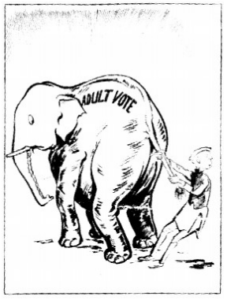Chapter – 3
Election and Representation
In this post, we have given the Important Questions of Class 11 Political Science Chapter 3 (Election and Representation) in English. These Important Questions are useful for the students who are going to appear in class 11 board exams.
| Board | CBSE Board, UP Board, JAC Board, Bihar Board, HBSE Board, UBSE Board, PSEB Board, RBSE Board |
| Textbook | NCERT |
| Class | Class 11 |
| Subject | Political Science |
| Chapter no. | Chapter 3 |
| Chapter Name | (Election and Representation) |
| Category | Class 11 Political Science Important Questions in English |
| Medium | English |
Chapter 3 Election and Representation
One Mark Questions
Q1. What does direct democracy mean?
Ans. A governance system in which citizens directly participate in government decisions.
Q2. What is meant by indirect democracy?
Ans. A governance system in which citizens send their representatives and they decide in the name of the public.
Q3. What is an election?
Ans. The method by which the public selects their representatives is called election or election
Q4. What are voters called?
Ans. Persons above 18 years of age who vote in elections.
Q5. Who prepares the voter lists?
Ans. Election commission
Q6. Who was the first Election Commissioner of India?
Ans. Sukumar Sen
Q7. What does special majority mean?
Ans. Majority of the total number and two-thirds majority of the members present and voting.
Q8. Who allot election symbols to political parties?
Ans. Election Commission
Q9. Which election system is adopted in Rajya Sabha elections?
Ans. Proportional Representation System
Q10. Who is the current Chief Election Commissioner in India?
Ans. Sunil Arora
Two Marks Questions
Q1. Write two differences between direct and indirect democracy.
Ans. In direct democracy, the public participates directly in governance, while in indirect elections, the representatives chosen by the public take part, in direct democracy, every person demands himself as the ruler, while in the indirect, the people’s representative considers himself as the ruler.
Q2. What does the first past the post system mean?
Ans. This system means that the candidate who gets ahead of other candidates in the electoral race is the victor.
Q3. What is a proportional representation system?
Ans. In this system, a party gets the same proportion of seats, how many percent it gets votes, there are two types of it, such as somewhere the entire country is considered to be a single constituency, on which the whole country is divided into many member constituencies.
Q4. What is a secret ballot system?
Ans. In the indirect democracy system, the system of conducting the election of the representatives is of secret voting in which no one except the voter knows who has been voted.
Q5. What do you understand by reserved constituencies?
Ans. The constitution provides that in order to ensure the presence of minorities or lower class people’s representatives also reached the Parliament, Delimitation Commission periodically makes reserved seats for deprived sections, it is called reserved constituency.
Q6. What are the two elements of the success of an election system?
Ans. Transparent elections, independent elections.
Q7. Explain Delimitation Commission in brief.
Ans. Delimitation Commission workes with the Election Commission of India, which determines the bounda ries of the constituency for election.
Q8. Write the demerits of Indian Election System?
Ans. Demerits of electoral competition are:
- It creates disunity and factionalism in every locality
- Different political Parties and leaders often level allegations against one another. Parties and candidates often used dirty tricks to win elections.
- It is often said that the pressure to win electoral fights does not allow sensible long-term policies to be formulated.
- Some good people do wish to serve the country but do not like to do so because of being dragged into unhealthy competition.
Four Marks Questions
Q1. Write four differences between ‘first past the post system’ and ‘proportional representation election system.
Ans. FPTP :- Divides the country into small constituencies. One representative is elected from each constituency. The voter votes for the candidate. The candidate knows the candidate personally. Proportional representation is one constituency of the entire country. In more than one is elected. The voter votes for the party. This voter votes in secret to the party so the candidate does not know.
Q2. Write the four importance of universal sufferage / adult sufferage.
Ans.
- Universal franchise enforces the principle of public sovereignty
- This is in line with democratic principle
- Necessary for personal development
- It brings politics awareness
Q3. Describe the four main functions of the Election Commission of India.
Ans. Preparation of voter list
- To decide the method of election
- To conduct election inspection
- Release of election results
Q4. Explain every democracy in the ancient Greek city state.
Ans. The people of the entire city state would gather in an open space and choose their representative by raising their hands and used to get the approval of the public directly by taking up the daily government decision, it is called direct democracy system.
Q5. What qualifications have been set in the constitution to become members of Lok Sabha and Vidhan Sabha?
Ans. Should be a citizen of India
- 25 years of age should not be in the post of benefit
- should not be insolvent
- Not of criminal offense
Q6. Write a comment on the importance of elections in democracy?
Ans. Election has great importance in democracy. Election democracy is two sides of a coin. Today there is democracy in more than 100 countries in the world, where there is democracy, the election system is adopted to elect the people’s representatives.
Q7. Explain the difference between a separate electorate and a reserved constituency.
Ans. In the election of a representative of a community in a separate electorate, only people belonging to the same community can vote, all the voters in the reserved constituency will vote but the candidate will belong only to the community for which that seat is reserved.
Five Marks Questions
Q1. Watch the following cartoon carefully and answer the questions asked.

(i) What problem does the elephant appear to indicate in the cartoon?
Ans. Successful voting in first general election by controlling inexperienced voters
(ii) Which point is the pulling of the elephant’s tail?
Ans. Attempt to prepare uncontrolled voters to vote in elections
(iii) Name the leader who pulled the tail of the elephant.
Ans. Pandit Jawaharlal Nehru
(iv) What do you understand by adult franchise?
Ans. To give the right to vote without discrimination to all citizens who are 18 years of age
Six Marks Questions
Q1. Describe any 6 suggestions to improve the Indian election system.
Ans. Election Reforms: –
- Replace proportional representation system in place of highest win system
- Election of women on one-third of seats in parliamentary and assembly
- Controlling the influence of money in elections
- Candidate secret of criminal case
- Use of caste ahd religion should be banned in election campaigning
- There should be transparency and democracy in political parties
Q2. Explain the sele’ction process of the Chief Election Commissioner of India and describe its major functions.
Ans. Appointment of the, Chief Election Commission. The salary by the President till the age of 6 years or 65 years is the same as the Judge of the Supreme Court. Work:-
- Preparation of voter list
- Setting election schedule
- To conduct free and fair elections
- Recognizing both parties as national one state party
- Monitoring the election
- Getting the President elected Vice President
Q3. Explain the various stages of India’s election process.
Ans. Election process :-
- Issue of notification by the Election Commission
- Date of withdrawal of application date of election
- Monitoring of election campaign and election campaign
- Make elections free and fair on the date
- Counting
- Declaring election results
- Appointment of election officials
- Establishment of polling stations
Q4. Highlight the salient features of India’s election system.
Ans. Features of election system :- India has adopted the system of winning by most votes. Its characteristics are :-
- This is simple
- In this, the representatives are accountable to the public.
- Every contact of voter and representative is there
- The system is basad on the principle of regional representation democracy
- It costs money
- National unity is strengthened by this system.
Q5. Electionrand democracy are two sides of a coin explaining this statement also explain the importance of elections in democracy.
Ans. Importance of elections in democracy
- Delegates ensure public participation in government by winning elections
- Elected representative will work according to the district
- This system increases public confidence
- Proper representation is necessary in a democracy which is possible only through elections.
- Protection of the rights and freedoms of citizens is only by fair representation.
- National unity is strengthened by appropriate representatives.
We hope that Class 11 Political Science Chapter 3 (Election and Representation) Important Questions in English helped you. If you have any queries about class 11 Political Science Chapter 3 (Election and Representation) Important Questions in English or about any other notes of class 11 Political Science in English, so you can comment below. We will reach you as soon as possible…



Dear crisscrossclasses.com webmaster, Your posts are always well written and informative.